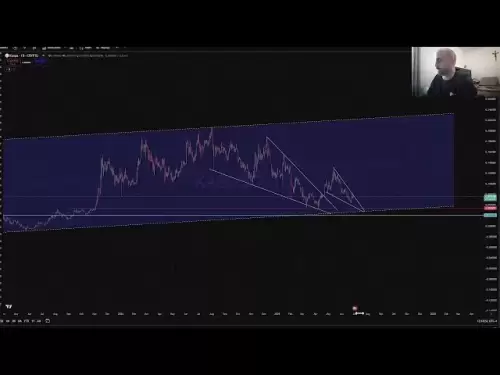-
 Bitcoin
Bitcoin $107,341.7259
0.15% -
 Ethereum
Ethereum $2,438.6204
0.70% -
 Tether USDt
Tether USDt $1.0003
-0.02% -
 XRP
XRP $2.1866
1.94% -
 BNB
BNB $649.0952
0.36% -
 Solana
Solana $150.9602
5.63% -
 USDC
USDC $0.9999
0.00% -
 TRON
TRON $0.2742
0.40% -
 Dogecoin
Dogecoin $0.1645
1.93% -
 Cardano
Cardano $0.5669
1.18% -
 Hyperliquid
Hyperliquid $37.8286
4.19% -
 Bitcoin Cash
Bitcoin Cash $491.4669
-2.74% -
 Sui
Sui $2.8150
3.06% -
 Chainlink
Chainlink $13.4184
2.91% -
 UNUS SED LEO
UNUS SED LEO $9.0809
0.27% -
 Avalanche
Avalanche $18.0295
2.60% -
 Stellar
Stellar $0.2396
1.19% -
 Toncoin
Toncoin $2.8587
0.13% -
 Shiba Inu
Shiba Inu $0.0...01160
2.59% -
 Litecoin
Litecoin $86.4192
1.45% -
 Hedera
Hedera $0.1486
1.19% -
 Monero
Monero $308.4324
0.87% -
 Polkadot
Polkadot $3.4202
1.43% -
 Bitget Token
Bitget Token $4.6436
-0.34% -
 Dai
Dai $0.9998
-0.02% -
 Ethena USDe
Ethena USDe $1.0002
0.00% -
 Uniswap
Uniswap $7.1527
3.29% -
 Pi
Pi $0.5357
-8.45% -
 Pepe
Pepe $0.0...09588
4.61% -
 Aave
Aave $259.9759
0.81%
How are the transaction fees of virtual currency calculated?
Crypto transaction fees, unlike fixed banking fees, fluctuate based on network congestion and transaction size; users can adjust fees, balancing speed and cost, understanding this dynamic is key for efficient cryptocurrency transactions.
Mar 11, 2025 at 08:50 am
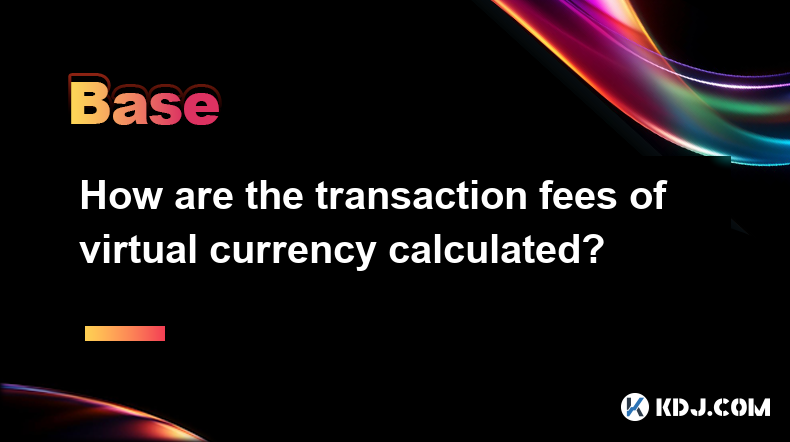
Key Points:
- Transaction fees in cryptocurrency are not standardized and vary significantly across different blockchains.
- Fees are primarily determined by network congestion and the size of the transaction.
- Miners and validators are incentivized to prioritize transactions with higher fees, leading to a fee market.
- Users can generally adjust their transaction fees, balancing speed and cost.
- Understanding fee structures is crucial for efficient and cost-effective cryptocurrency transactions.
How are the Transaction Fees of Virtual Currency Calculated?
The calculation of transaction fees in the cryptocurrency world is a complex process, far from a simple, universal formula. It's a dynamic system influenced by several interacting factors, primarily focusing on network demand and transaction size. Unlike traditional banking fees which are often fixed or predictable, crypto fees are constantly fluctuating.
The most significant factor influencing transaction fees is network congestion. When many users are simultaneously trying to send transactions, the network becomes congested. This increased demand drives up the price of transaction fees as miners (or validators in proof-of-stake networks) prioritize transactions offering higher fees. Think of it like a competitive auction for transaction processing.
Transaction size also plays a crucial role. Larger transactions, containing more data, require more processing power from miners. Consequently, larger transactions generally incur higher fees. The specific data influencing size includes the number of inputs and outputs within a transaction. More complex transactions, such as those involving multiple addresses or large amounts of cryptocurrency, naturally demand higher fees.
Different cryptocurrencies employ different fee structures. Some utilize a simple flat fee, while others use a more sophisticated system that dynamically adjusts fees based on network congestion. Bitcoin, for example, allows users to specify a transaction fee, with miners prioritizing transactions offering the highest fees per byte. Ethereum's gas system provides a more complex fee structure, where users pay a certain amount of "gas" for each computational step required to process their transaction. The gas price, expressed in Gwei (a unit of Ether), fluctuates based on network demand.
Understanding Fee Structures Across Different Blockchains:
Each blockchain has its unique approach to calculating transaction fees. Let's delve into a few examples:
- Bitcoin (BTC): Bitcoin miners prioritize transactions with higher fees per kilobyte (kB). Users can set their own fees, but choosing a fee too low can lead to significant delays or even transaction failure. Various online tools provide fee estimations based on current network conditions.
- Ethereum (ETH): Ethereum uses the "gas" system. The transaction fee is calculated by multiplying the gas used by the gas price. The gas used depends on the complexity of the transaction, while the gas price fluctuates based on network demand. Higher gas prices lead to faster transaction confirmations.
- Binance Smart Chain (BSC): BSC typically has lower transaction fees compared to Ethereum. However, the fee structure can vary based on network congestion. Similar to Ethereum, transaction costs are calculated based on gas usage and gas price.
- Solana (SOL): Solana's transaction fees are generally very low, aiming for high throughput and scalability. However, like other blockchains, fees can increase during periods of high network activity.
Adjusting Transaction Fees:
Most cryptocurrency wallets offer options to adjust transaction fees. Users can typically choose between different fee levels:
- Low: This option results in lower fees but potentially longer confirmation times.
- Medium: This is a balance between cost and speed.
- High: This option ensures faster transaction confirmations but incurs higher fees.
Choosing the Right Fee:
The optimal fee depends on individual priorities. If speed is paramount, selecting a higher fee is advisable. Conversely, if minimizing costs is the primary goal, a lower fee might suffice, though one must accept the potential for delays.
Frequently Asked Questions:
Q: What happens if I set my transaction fee too low?
A: If you set your transaction fee too low, your transaction might not be processed quickly, or it might not be processed at all. Miners will prioritize transactions with higher fees, leaving your transaction pending indefinitely.
Q: How can I estimate the transaction fee before sending?
A: Many cryptocurrency wallets and exchanges provide fee estimation tools. These tools consider current network conditions to give you an idea of the expected fee. Third-party websites also offer fee estimation services for various blockchains.
Q: Are transaction fees deducted from my cryptocurrency balance?
A: Yes, transaction fees are deducted from the sender's cryptocurrency balance. The amount deducted is the fee you specified or the fee calculated based on the blockchain's fee structure.
Q: Do transaction fees vary based on the amount of cryptocurrency being sent?
A: While the amount of cryptocurrency sent doesn't directly determine the fee in all cases, larger transactions might involve more data and thus could incur slightly higher fees due to increased processing requirements. The primary fee determinant is usually network congestion and transaction complexity.
Q: Can I avoid paying transaction fees?
A: No, you cannot completely avoid paying transaction fees in most cryptocurrencies. These fees are essential for incentivizing miners or validators to process transactions and secure the network. Some layer-2 scaling solutions attempt to minimize these fees but still require some transaction costs.
Disclaimer:info@kdj.com
The information provided is not trading advice. kdj.com does not assume any responsibility for any investments made based on the information provided in this article. Cryptocurrencies are highly volatile and it is highly recommended that you invest with caution after thorough research!
If you believe that the content used on this website infringes your copyright, please contact us immediately (info@kdj.com) and we will delete it promptly.
- XRP, Ripple, and Bitcoin: Decoding the Latest Crypto Moves
- 2025-06-29 08:30:13
- NBA Legend Scottie Pippen's Crypto Picks: SHIB and XRP in the Spotlight
- 2025-06-29 08:50:12
- Bitcoin, US Strategy, and Cryptocurrency Regulation: Navigating the Digital Frontier
- 2025-06-29 09:10:13
- Chainlink's $17 Breakout: Bullish Momentum Fueled by Mastercard Partnership
- 2025-06-29 08:30:13
- Crypto Launches Q3 2025: Top Picks to Watch
- 2025-06-29 09:10:13
- BTC Bull Token: Riding Bitcoin's Bull Run to Crypto Glory
- 2025-06-29 09:30:11
Related knowledge
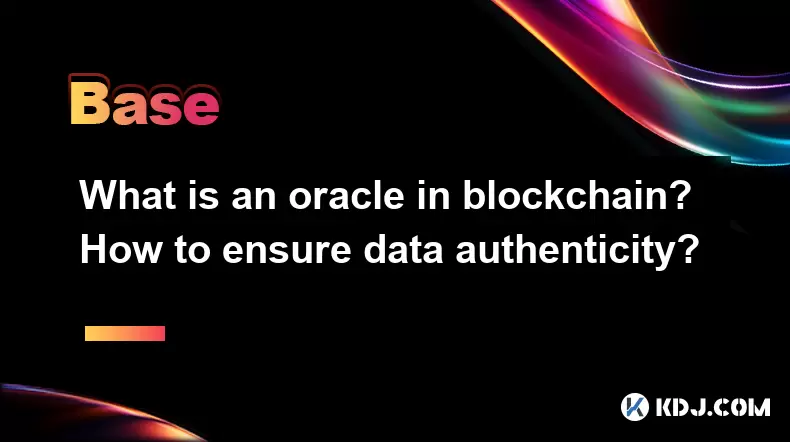
What is an oracle in blockchain? How to ensure data authenticity?
Jun 19,2025 at 08:49pm
Understanding the Role of an Oracle in BlockchainIn the context of blockchain technology, an oracle serves as a bridge between the blockchain and external data sources. While blockchains are inherently secure and decentralized, they cannot access real-world information on their own. Oracles enable smart contracts to interact with off-chain data such as ...
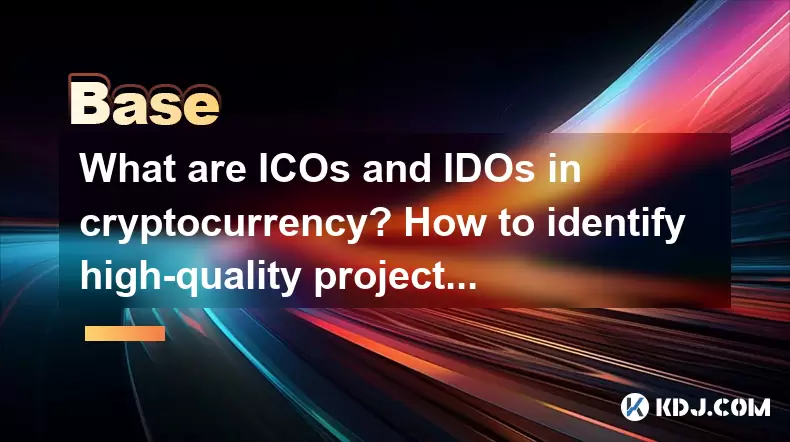
What are ICOs and IDOs in cryptocurrency? How to identify high-quality projects?
Jun 22,2025 at 11:49am
Understanding ICOs in CryptocurrencyInitial Coin Offerings (ICOs) are fundraising mechanisms used by cryptocurrency startups to raise capital for their projects. In an ICO, a company creates and sells its own tokens to investors in exchange for established cryptocurrencies like Bitcoin or Ethereum. The process typically involves the release of a whitepa...
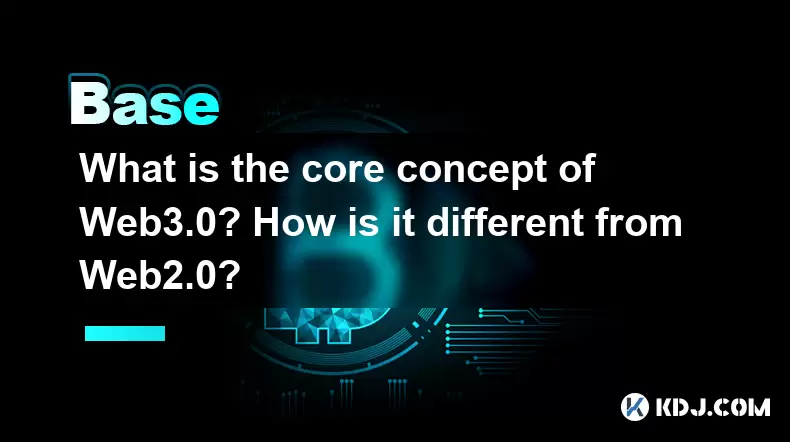
What is the core concept of Web3.0? How is it different from Web2.0?
Jun 21,2025 at 05:56pm
Decentralization as the Foundation of Web3.0The core concept of Web3.0 revolves around decentralization, which fundamentally challenges the centralized architecture of Web2.0. In Web3.0, control and ownership are distributed across a network rather than being held by a central authority or corporation. This is achieved primarily through blockchain techn...
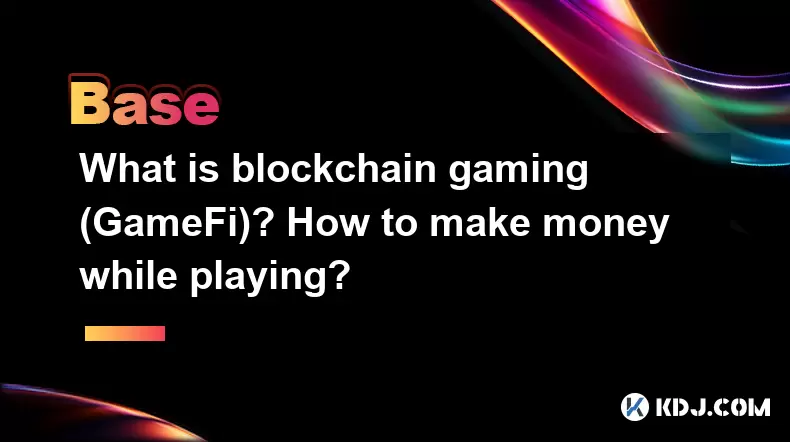
What is blockchain gaming (GameFi)? How to make money while playing?
Jun 20,2025 at 07:56am
Understanding Blockchain Gaming (GameFi)Blockchain gaming, often referred to as GameFi, is a fusion of blockchain technology and video games. It enables players to own in-game assets through non-fungible tokens (NFTs) and earn rewards via cryptocurrencies or token-based systems. Unlike traditional games where items are controlled by centralized develope...
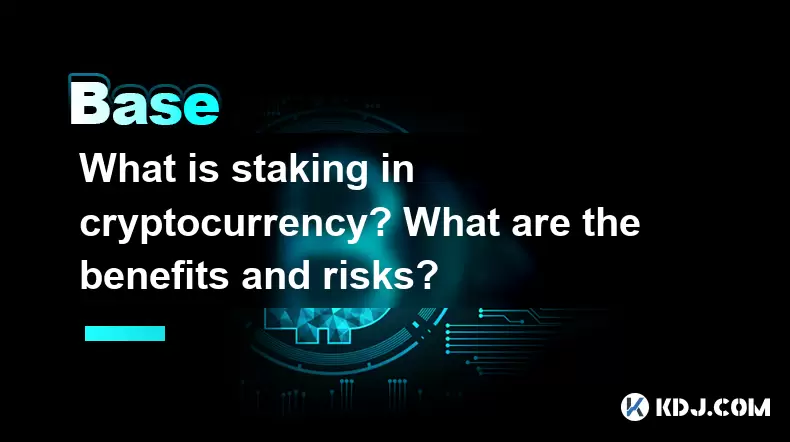
What is staking in cryptocurrency? What are the benefits and risks?
Jun 22,2025 at 10:01am
Understanding the Concept of Staking in CryptocurrencyStaking in cryptocurrency refers to the process of actively participating in transaction validation on a blockchain network that uses a Proof-of-Stake (PoS) consensus mechanism. Instead of miners competing to solve complex mathematical puzzles as in Proof-of-Work systems like Bitcoin, PoS blockchains...
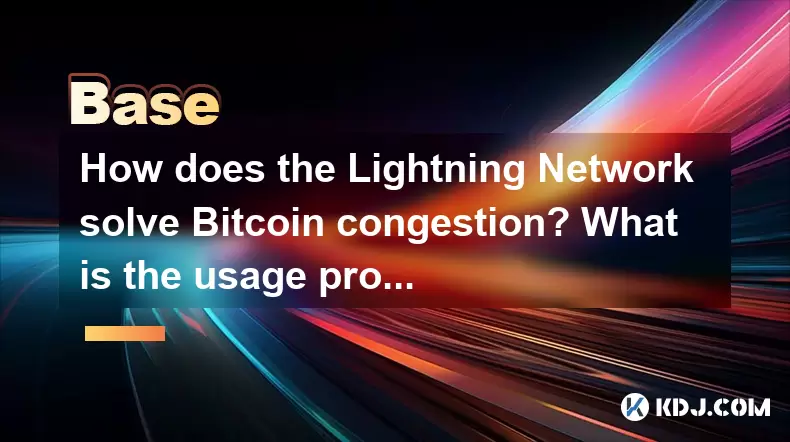
How does the Lightning Network solve Bitcoin congestion? What is the usage process?
Jun 23,2025 at 06:21pm
Understanding Bitcoin Network CongestionBitcoin, as a decentralized digital currency, operates on a blockchain that records every transaction in a public ledger. Each block has a limited size, typically 1 megabyte, which allows for only a certain number of transactions per second (TPS). When the number of transactions increases, the network becomes cong...

What is an oracle in blockchain? How to ensure data authenticity?
Jun 19,2025 at 08:49pm
Understanding the Role of an Oracle in BlockchainIn the context of blockchain technology, an oracle serves as a bridge between the blockchain and external data sources. While blockchains are inherently secure and decentralized, they cannot access real-world information on their own. Oracles enable smart contracts to interact with off-chain data such as ...

What are ICOs and IDOs in cryptocurrency? How to identify high-quality projects?
Jun 22,2025 at 11:49am
Understanding ICOs in CryptocurrencyInitial Coin Offerings (ICOs) are fundraising mechanisms used by cryptocurrency startups to raise capital for their projects. In an ICO, a company creates and sells its own tokens to investors in exchange for established cryptocurrencies like Bitcoin or Ethereum. The process typically involves the release of a whitepa...

What is the core concept of Web3.0? How is it different from Web2.0?
Jun 21,2025 at 05:56pm
Decentralization as the Foundation of Web3.0The core concept of Web3.0 revolves around decentralization, which fundamentally challenges the centralized architecture of Web2.0. In Web3.0, control and ownership are distributed across a network rather than being held by a central authority or corporation. This is achieved primarily through blockchain techn...

What is blockchain gaming (GameFi)? How to make money while playing?
Jun 20,2025 at 07:56am
Understanding Blockchain Gaming (GameFi)Blockchain gaming, often referred to as GameFi, is a fusion of blockchain technology and video games. It enables players to own in-game assets through non-fungible tokens (NFTs) and earn rewards via cryptocurrencies or token-based systems. Unlike traditional games where items are controlled by centralized develope...

What is staking in cryptocurrency? What are the benefits and risks?
Jun 22,2025 at 10:01am
Understanding the Concept of Staking in CryptocurrencyStaking in cryptocurrency refers to the process of actively participating in transaction validation on a blockchain network that uses a Proof-of-Stake (PoS) consensus mechanism. Instead of miners competing to solve complex mathematical puzzles as in Proof-of-Work systems like Bitcoin, PoS blockchains...

How does the Lightning Network solve Bitcoin congestion? What is the usage process?
Jun 23,2025 at 06:21pm
Understanding Bitcoin Network CongestionBitcoin, as a decentralized digital currency, operates on a blockchain that records every transaction in a public ledger. Each block has a limited size, typically 1 megabyte, which allows for only a certain number of transactions per second (TPS). When the number of transactions increases, the network becomes cong...
See all articles























